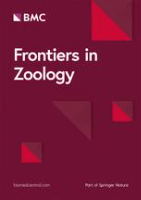
Frontiers in Zoology
Scope & Guideline
Exploring the intricate tapestry of animal science.
Introduction
Aims and Scopes
- Evolutionary and Developmental Biology:
The journal publishes studies that explore the evolutionary processes and developmental mechanisms influencing the diversity of animal life, including adaptations and morphological changes. - Ecology and Environmental Interactions:
Research on ecological dynamics, species interactions, habitat preferences, and the impacts of environmental changes on animal populations is a core area of focus. - Behavioral Ecology and Social Structure:
The journal highlights studies that investigate animal behavior, including foraging strategies, mating systems, social interactions, and communication among species. - Physiological Adaptations:
Submissions that examine physiological processes and adaptations in animals, particularly in response to environmental stressors, are frequently featured. - Conservation and Biodiversity:
The journal emphasizes research that informs conservation strategies and biodiversity assessments, addressing the challenges faced by various species in changing environments. - Technological and Methodological Innovations:
Frontiers in Zoology also welcomes methodological advancements and technological applications that enhance research capabilities in zoological studies.
Trending and Emerging
- Molecular and Genomic Approaches to Zoology:
There is a notable increase in studies utilizing molecular techniques, including genomic analyses, to investigate evolutionary relationships and adaptations, reflecting the growing importance of molecular biology in understanding animal diversity. - Impact of Climate Change on Animal Populations:
Research addressing the effects of climate change on species distribution, behavior, and physiology is gaining traction, underscoring the urgency of understanding how global warming impacts biodiversity. - Animal-Human Interactions and Urban Ecology:
Emerging studies are focusing on the interactions between wildlife and urban environments, examining how animals adapt to human-dominated landscapes and the implications for conservation. - Microbiome Research in Animals:
An increasing number of papers explore the role of microbiomes in animal health and ecology, indicating a growing recognition of the importance of symbiotic relationships in animal biology. - Innovations in Tracking and Monitoring Animal Behavior:
Advancements in tracking technologies, such as remote sensing and bio-logging, are being increasingly employed to study animal behavior and ecology, revealing insights into movement patterns and habitat use.
Declining or Waning
- Traditional Taxonomy and Classification Studies:
There appears to be a waning interest in purely descriptive taxonomic studies, as the emphasis has shifted towards integrative approaches utilizing molecular techniques and phylogenetics. - Historical Ecology and Paleoecology:
Research focusing on historical ecological frameworks and paleoecological reconstructions has seen reduced publication frequency, possibly due to a growing focus on contemporary ecological and conservation issues. - Generalized Behavioral Studies without Ecological Context:
Studies that report animal behavior without linking it to ecological or evolutionary implications have decreased, as journals and researchers prioritize work with broader ecological relevance.
Similar Journals

BMC Zoology
Unlocking the mysteries of the animal kingdom.BMC Zoology, published by BMC, is a distinguished open-access journal that has been advancing the field of zoological research since its inception in 2016. With an impressive Q2 ranking in both Animal Science and Zoology categories as of 2023, the journal occupies a significant position in the academic landscape, engaging a global readership dedicated to the exploration of animal biology. Based in the United Kingdom, BMC Zoology prides itself on providing a platform for innovative research, fostering collaboration among scientists, and facilitating access to high-quality scholarly articles. Researchers and practitioners in zoology can benefit from its extensive repository of articles that span various areas including conservation, ecology, and evolutionary biology. As an essential resource for scholars and students alike, BMC Zoology commits to enhancing the dissemination of knowledge in the zoological sciences through its open-access model, ensuring widespread access to cutting-edge research findings.

Avian Biology Research
Fostering a deeper understanding of our feathered friends.Avian Biology Research, published by SAGE PUBLICATIONS LTD, is a leading journal dedicated to advancing the study of avian species through high-quality, peer-reviewed research. With an ISSN of 1758-1559 and an E-ISSN of 1758-1567, this journal has established itself as a vital resource within the fields of Animal Science and Zoology, as well as Ecology, Evolution, Behavior, and Systematics. The journal is currently ranked Q3 in both categories according to the 2023 release of the category quartiles, and it contributes significantly to the global understanding of avian biology, including behavior, physiology, and conservation efforts. Positioned within the competitive landscape of the Scopus rankings, it finds itself amidst a diverse array of research, with medical and environmental implications. As an open-access journal, Avian Biology Research ensures greater accessibility to its contents, fostering disseminative opportunities for researchers, professionals, and students alike. With a publication window spanning from 2008 to 2024, it continues to be an invaluable platform for the dissemination and dialogue of avian research, thereby enlightening future inquiries and driving scientific advancements in this crucial area of biology.
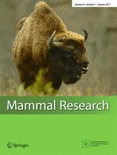
Mammal Research
Innovating Insights into Mammals and Their EcosystemsMammal Research, published by Springer Heidelberg, is a prominent academic journal dedicated to advancing knowledge in the fields of Animal Science, Zoology, Ecology, Evolution, and Behavior. With an impressive Q2 ranking in both Animal Science and Zoology and Ecology, Evolution, Behavior and Systematics as of 2023, this journal is an essential resource for researchers and professionals seeking to publish innovative findings that contribute to our understanding of mammalian biology. The journal operates under an Open Access model, allowing a wide audience to access and engage with high-quality research articles. Converging between 2015 to 2024, Mammal Research serves as a vital platform for scholarly discourse, promoting rigorous scientific inquiry and collaboration among experts and students alike in the fascinating study of mammals.

RUSSIAN JOURNAL OF HERPETOLOGY
Unveiling the Mysteries of HerpetofaunaRUSSIAN JOURNAL OF HERPETOLOGY is a prominent scholarly publication dedicated to the field of herpetology, focusing on the study of reptiles and amphibians. Published by FOLIUM PUBL CO in the Russian Federation, this journal aims to foster the exchange of knowledge and research in animal science, ecology, evolution, and behavior. With its ISSN 1026-2296 and a significant commitment to high-quality academic discourse, the journal maintains a respectable standing within the Q3 quartile in both Animal Science and Zoology, as well as in Ecology, Evolution, Behavior, and Systematics. This attributes to its Scopus rank among leading journals in related fields, enhancing its visibility and influence. Spanning from 2014 through 2024, it publishes rigorous research that explores the diversity, biology, and conservation of herpetofauna, making it a vital resource for researchers, professionals, and students alike who are invested in the ecological and evolutionary dynamics of these species.

CANADIAN JOURNAL OF ZOOLOGY
Unveiling Nature's Mysteries Through ResearchWelcome to the Canadian Journal of Zoology, a leading academic journal in the fields of Animal Science and Zoology as well as Ecology, Evolution, Behavior and Systematics. Published by Canadian Science Publishing since 1965, this esteemed journal serves as a vital platform for researchers, professionals, and students to disseminate and engage with significant findings in zoological and ecological research. With an impact factor placing it in the Q2 category and rankings reflecting its influence (201/490 in Animal Science and Zoology; 372/721 in Ecology), the journal is committed to advancing the understanding of animal biology and environmental interactions. Although currently not an open access publication, it provides comprehensive resources and studies that are crucial for the academic community. Based in Ottawa, Canada, the journal continues to push the boundary of knowledge right up to 2024 and beyond, making it an essential resource for anyone dedicated to the life sciences.
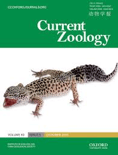
Current Zoology
Advancing the Frontiers of Animal ScienceCurrent Zoology, published by Oxford University Press, is a leading open-access journal dedicated to advancing the field of zoology and animal science since its establishment in 2009. With an impressive Q1 ranking in Animal Science and Zoology as of 2023, the journal maintains a prominent position within the academic community, supported by a ranking of #138 out of 490 in Scopus. Current Zoology serves as a vital platform for researchers, professionals, and students, showcasing high-quality research that spans a broad array of topics within the domain of zoology. This journal is characterized by its rigorous peer-review process, ensuring the dissemination of credible and impactful findings that contribute to the understanding of animal biology and conservation efforts. The open-access model enhances accessibility, allowing a wider audience to engage with the pivotal research being conducted in this dynamic field. Processing all manuscripts in an efficient manner and featuring articles that push the boundaries of current knowledge, Current Zoology is your gateway to explore innovative discoveries and trends in zoology.
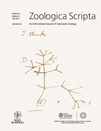
ZOOLOGICA SCRIPTA
Pioneering research in zoology and molecular biology.Zoologica Scripta, published by Wiley, stands as a distinguished journal within the fields of Animal Science and Zoology, Ecology, Evolution, Behavior and Systematics, Genetics, and Molecular Biology. With its inception dating back to 1971 and a convergence year extending to 2024, this journal consistently provides a platform for high-quality research, earning a Q1 ranking in two key categories and solid performance in additional fields, as evidenced by its significant Scopus rankings and impressive percentiles. Notably, it ranks 36 out of 490 journals in Animal Science and Zoology, placing it in the 92nd percentile. While Zoologica Scripta operates under a traditional access model, its rigorous peer-review process ensures that only the most impactful studies make their way into its pages. With a focus on advancing our understanding of biodiversity and evolutionary processes, this journal is indispensable for researchers, professionals, and students committed to the ongoing exploration of animal sciences and ecological studies.
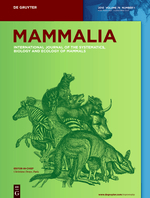
MAMMALIA
Connecting researchers through mammalian studies.MAMMALIA, published by Walter de Gruyter GmbH, is a renowned academic journal founded in 1936 that serves as a pivotal resource for researchers and professionals in the fields of Animal Science and Zoology as well as Ecology, Evolution, Behavior and Systematics. With an ISSN of 0025-1461 and an E-ISSN of 1864-1547, this journal has made significant contributions to mammalian research over the decades and continues to be pivotal in advancing knowledge within the scientific community. MAMMALIA is indexed in prominent databases, boasting a current Scopus ranking that places it within the upper echelons of the Q2 category in Animal Science and Zoology, and Q3 in Ecology, Evolution, Behavior and Systematics. Although it does not offer open access, the journal remains accessible through various academic institutions, ensuring that valuable research findings are disseminated widely. The journal’s commitment to quality and excellence in the study of mammals aligns with its high impact within the field, engaging a diverse readership that includes researchers, students, and professionals dedicated to furthering the understanding of mammalian biology. For more information, visit their office located at Genthiner Strasse 13, D-10785 Berlin, Germany.

CRUSTACEANA
Pioneering Research in Animal and Aquatic SciencesCRUSTACEANA, published by BRILL, stands as a pivotal resource in the field of Animal Science and Zoology as well as Aquatic Science, with a focus on advancing the understanding of crustacean biology, ecology, and evolution. With an ISSN of 0011-216X and an E-ISSN of 1568-5403, this journal has been curating significant research since its inception in 1960 and continues to contribute scholarly knowledge up to 2024. Although it operates without an Open Access option, CRUSTACEANA holds a commendable Q3 ranking in both the Animal Science and Aquatic Science categories for 2023. Furthermore, it consistently provides insightful articles that enrich the academic dialogue surrounding aquatic ecosystems, making it a valuable platform for researchers, professionals, and students alike.
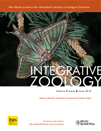
Integrative Zoology
Unveiling the Complexities of Animal LifeIntegrative Zoology is a distinguished journal published by WILEY, focusing on advancing the field of zoological sciences through the integration of various biological disciplines. With both ISSN 1749-4877 and E-ISSN 1749-4869 identifiers, this journal features research that fosters a deeper understanding of animal biology, ecology, and conservation strategies. As a testament to its impact, Integrative Zoology is recognized within the Q1 category of Animal Science and Zoology in 2023, ranking an impressive #27 out of 490 journals in its field, placing it in the 94th percentile among peers. Published in the United Kingdom, this journal not only serves as a critical platform for novel research but also engages a global audience, inviting submissions that bridge theoretical and practical aspects of zoology. While not entirely open access, the journal remains committed to disseminating high-quality research that contributes substantially to scientific advancements. Through its continuous publication since 2008, Integrative Zoology aims to inspire researchers, educators, and students alike, making it a cornerstone for anyone passionate about the complexities of animal life.